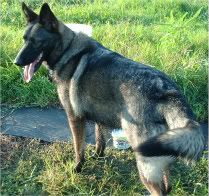 Re: How to know when a dog knows a command
[Re: Connie Sutherland ]
#383933 - 10/09/2013 03:03 PM Re: How to know when a dog knows a command
[Re: Connie Sutherland ]
#383933 - 10/09/2013 03:03 PM |
Webboard User

Reg: 10-01-2013
Posts: 343
Loc: nyc
 Offline Offline |
|
Good catch, Wendy.
Stop correcting by popping him with a prong.
This may not need saying, since it's probably really clear that you are not at the correcting stage for anything.
Read my reply to Wendy where I explain what I pop him for. I’m not sure how to deal with those situations.
And don’t tell me not to go outside, I can’t, I’m in an apartment and we have a routine of 2 hours in the park so he can run, play and so on (on a 30 ft line, we play a flirt pole, tug, fetch, some commands, etc).
"If you're saying it's not a big deal that I thought proofing means corrections and it's OK that I've been popping his prong at least once every day for the past 3 months then I will go on experimenting. "
I'm not. I'm saying that it's time to use your new knowledge.
I am. But I’m using this example to say that I think I do have to learn things before I go out and do whatever. As you can see, my “whatever” is a bad idea, I’m doing more harm than good.
Train. Start with zero distraction. For me, that's indoors.
Proof.
Put corrections on the back burner.
Ok so I shouldn’t do any commands outside? Just play?
I mean we are still going outside every day.
Confusing training mixed with unfair corrections is not a good thing.
Marker training and proofing ... this is not going to damage your bond.
That’s exactly what I’ve been saying. I’m sure I did lots of damage by now so that’s why I’m being cautious before doing anything else.
That’s why I’m looking for a place where I can ask everything I’m unsure of before I do anymore damage.
I don’t agree with someone saying to just go out and do things. I’ve been doing that for the past 6 months and nothing good came out of it.
Edited by Connie Sutherland (10/09/2013 03:03 PM)
Edit reason: fix broken quotes
|
 Top Top
|
 Re: How to know when a dog knows a command
[Re: Natalie Rynda ]
#383935 - 10/09/2013 02:58 PM Re: How to know when a dog knows a command
[Re: Natalie Rynda ]
#383935 - 10/09/2013 02:58 PM |
Webboard User

  
Reg: 03-17-2006
Posts: 4203
Loc:
 Offline Offline |
|
So that means it will go something like this
1. Teach a command
2. Proof it
3. Correct for non compliance
Next command
Repeat
Right?
Again, I'm not stuck on correcting, I actually don't like to correct and probably can't correct hard enough.
I'm only asking because I want to understand where corrections come in so that I don't mess him up by using them in the wrong stage.
I'm about to post about the problems I'm having and how I'm correcting him for it.
I'd love a different way.
I don't like to try and follow an exact script. Some things I'll end up proofing with corrections, some things by withholding the reward, some things by setting him up to make correct choices. I know you mentioned something about liking details, but in some ways focusing so much on something like how hard to correct and trying to figure it out from a written word isn't going to help you.
I don't think there's any video, anywhere that's going to show something like that either.
Dogs act in their own best interest. They do what satisfies themselves and they avoid what is 'unpleasant' That's a broad statement that leaves a whole lot of in between for you to figure out and try to show him his best interest is doing what you want.
Just take one simple thing like sit and see what he wants bad enough to give you the response you want. Now you'll have an idea of what to use for rewarding and withholding from him.
Try conditioning him to corrections the way I said, prong is fine, just try to get results with the lightest pop you can. Keep it simple and pay attention to your dog. Figure out what works with him.
|
 Top Top
|
 Re: How to know when a dog knows a command
[Re: Connie Sutherland ]
#383936 - 10/09/2013 02:58 PM Re: How to know when a dog knows a command
[Re: Connie Sutherland ]
#383936 - 10/09/2013 02:58 PM |
Webboard User

Reg: 10-01-2013
Posts: 343
Loc: nyc
 Offline Offline |
|
Almost all of this post it is about desensitizing (and there are volumes written on the board about it); this thread's answers have been about knowing basic ob commands.
The answers in the thread so far don't all apply to the cat problems or the reactivity.
Are your parents involved in this dog's training? (Was I wrong in assuming that you're a teenager?)
lol, very wrong, i'm the parent.
Wendy said i shouldn't be using the prong and i'm telling her that in some cases i'm not sure i have a choice. young or not, he's 80 lbs, untrained and very strong
|
 Top Top
|
 Re: How to know when a dog knows a command
[Re: Connie Sutherland ]
#383937 - 10/09/2013 03:01 PM Re: How to know when a dog knows a command
[Re: Connie Sutherland ]
#383937 - 10/09/2013 03:01 PM |
Webboard User

Reg: 10-01-2013
Posts: 343
Loc: nyc
 Offline Offline |
|
|
 Top Top
|
 Re: How to know when a dog knows a command
[Re: Natalie Rynda ]
#383938 - 10/09/2013 03:00 PM Re: How to know when a dog knows a command
[Re: Natalie Rynda ]
#383938 - 10/09/2013 03:00 PM |
Moderator

   
Reg: 07-13-2005
Posts: 31580
Loc: North-Central coast of California
 Offline Offline |
|
"lol, very wrong, i'm the parent."
OK, good. Because you are now into reactivity and crittering in your house. The answers in the thread so far don't all apply to the cat problems or the reactivity.
|
 Top Top
|
 Re: How to know when a dog knows a command
[Re: Connie Sutherland ]
#383939 - 10/09/2013 03:02 PM Re: How to know when a dog knows a command
[Re: Connie Sutherland ]
#383939 - 10/09/2013 03:02 PM |
Webboard User

Reg: 10-01-2013
Posts: 343
Loc: nyc
 Offline Offline |
|
"lol, very wrong, i'm the parent."
OK, good. Because you are now into reactivity and crittering in your house. The answers in the thread so far don't all apply to the cat problems or the reactivity.
i got a trainer for reactivity, and i'm seeing improvement. i only mentioned it because you guys are saying i shouldn't be using a prong on a 9 month old
|
 Top Top
|
 Re: How to know when a dog knows a command
[Re: Natalie Rynda ]
#383940 - 10/09/2013 03:04 PM Re: How to know when a dog knows a command
[Re: Natalie Rynda ]
#383940 - 10/09/2013 03:04 PM |
Webboard User

  
Reg: 03-17-2006
Posts: 4203
Loc:
 Offline Offline |
|
Because if you just put on a prong and don't use it the right way, its just another problem you'll have.
|
 Top Top
|
 Re: How to know when a dog knows a command
[Re: Natalie Rynda ]
#383941 - 10/09/2013 03:05 PM Re: How to know when a dog knows a command
[Re: Natalie Rynda ]
#383941 - 10/09/2013 03:05 PM |
Webboard User

  
Reg: 03-17-2006
Posts: 4203
Loc:
 Offline Offline |
|
Holey ****, there's a lot on this thread. Lol.
|
 Top Top
|
 Re: How to know when a dog knows a command
[Re: Natalie Rynda ]
#383942 - 10/09/2013 03:06 PM Re: How to know when a dog knows a command
[Re: Natalie Rynda ]
#383942 - 10/09/2013 03:06 PM |
Webboard User

  
Reg: 09-23-2011
Posts: 2692
Loc: Marrero, LA
 Offline Offline |
|
Natalie, JMHO, I have ahighly reactive dog who would act like that if I gave her a chance. I have to control her environment to stem the reactivity. If she's going to be a hot mess at the park, guess what? That's right.
If I want to go to Petco to see if I can proof some desensitizing, I pick a time when there is low traffic, and am always ready to abort.
With a reactive dog, any outing should include some desensitizing and a backup plan.

Sadie |
 Top Top
|
 Re: How to know when a dog knows a command
[Re: steve strom ]
#383944 - 10/09/2013 03:11 PM Re: How to know when a dog knows a command
[Re: steve strom ]
#383944 - 10/09/2013 03:11 PM |
Webboard User

Reg: 10-01-2013
Posts: 343
Loc: nyc
 Offline Offline |
|
I don't like to try and follow an exact script. Some things I'll end up proofing with corrections, some things by withholding the reward, some things by setting him up to make correct choices. I know you mentioned something about liking details, but in some ways focusing so much on something like how hard to correct and trying to figure it out from a written word isn't going to help you.
I don't think there's any video, anywhere that's going to show something like that either.
Dogs act in their own best interest. They do what satisfies themselves and they avoid what is 'unpleasant' That's a broad statement that leaves a whole lot of in between for you to figure out and try to show him his best interest is doing what you want.
Just take one simple thing like sit and see what he wants bad enough to give you the response you want. Now you'll have an idea of what to use for rewarding and withholding from him.
Try conditioning him to corrections the way I said, prong is fine, just try to get results with the lightest pop you can. Keep it simple and pay attention to your dog. Figure out what works with him.
he's already conditioned to corrections, he takes them in stride lol. i got lucky with a good dog.
i'm going to leave corrections alone for now except for aggression.
yeah, i have to have a "manual", like when this happens do this. training is way too new to me to be able to experiment. as i said, i've been experimenting since i first got him and i don't like the results.
|
 Top Top
|
When purchasing any product from Leerburg Enterprises, Inc. it is understood
that any and all products sold by Leerburg Enterprises, Inc. are sold in Dunn
County Wisconsin, USA. Any and all legal action taken against Leerburg Enterprises,
Inc. concerning the purchase or use of these products must take place in Dunn
County, Wisconsin. If customers do not agree with this policy they should not
purchase Leerburg Ent. Inc. products.
Dog Training is never without risk of injury. Do not use any of the products
sold by Leerburg Enterprises, Inc. without consulting a local professional.
The training methods shown in the Leerburg Ent. Inc. DVD’s are meant
to be used with a local instructor or trainer. Leerburg Enterprises, Inc. cannot
be held responsible for accidents or injuries to humans and/or animals.
Copyright 2010 Leerburg® Enterprises, Inc. All rights reserved. All photos and content on leerburg.com are part of a registered copyright owned by Leerburg Enterprise, Inc.
By accessing any information within Leerburg.com, you agree to abide by the
Leerburg.com Privacy Policy and Terms of Use.
 Previous Topic
Previous Topic Index
Index Next Topic
Next Topic












 Top
Top




